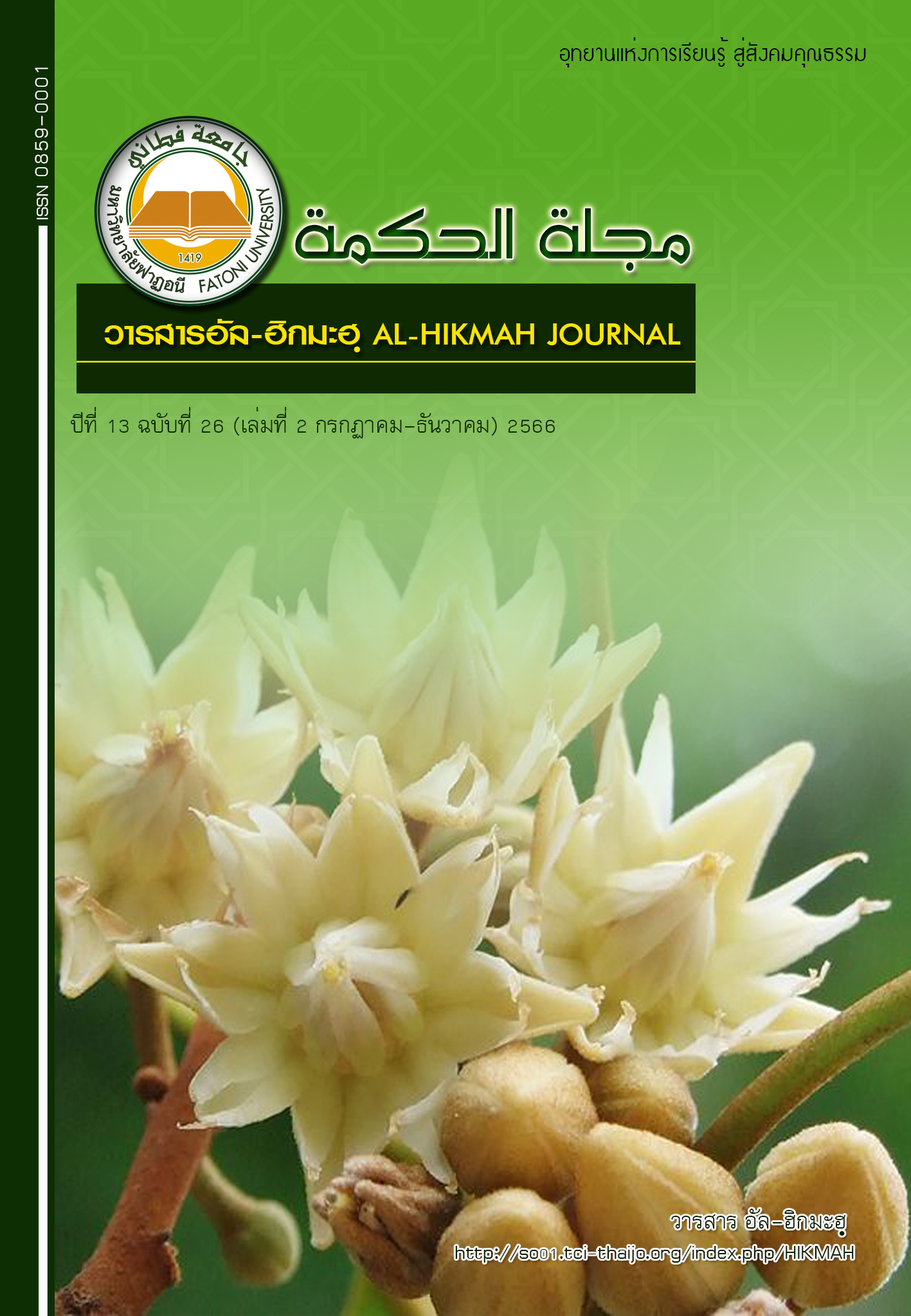Learning design to develop 21st century competencies for students in small private school in southernmost provinces of Thailand
Keywords:
instructional design, competency base education, teachingAbstract
The IIIP Model is a teaching model developed through participatory action research among secondary school teachers in private schools in the southernmost provinces of Thailand. Aimed to promote students' learning and determination skills, develop and construct readiness regarding competencies in the 21st century for students in private schools in the southernmost provinces, which has 4 elements: inspiration, information management, implementation and progress. The results of learning management with the IIIP model affect to develop 3 important competencies: 1) learning skills and innovation ; students have clear learning goals from adapting learning problems from daily life and make students to develop concrete pieces of work from their learning. 2) Information Literacy, Media and technology skills where students can search for information and develop work pieces by using information technology by themselves; and 3) life and career skills ;students have creativity, responsibility for themselves and society, Behave as a good Muslim.
References
Baum, F., MacDougall, C., & Smith, D. (2006). Participatory action research. Journal of Epidemiology and Community Health, 854-857.
Efendi, R., Jama, J., & Yulastri, A. (2019). Development of Competency Based Learning Model in Learning Computer Networks. Journal of Physics Conference Series.
Fisher, D., & Kusumah, Y. (2018). Developing student character of preservice mathematics teachers through blended learning . Journal of Physics, 1-9.
Gervais, J. (2016). The operatonal defniton of competency- based educaton. The Journal of Competency-Based Education, 98-106.
Henti, M., Jonhson, M. D., & Nepal, B. (2017). A Review of Competency-Based Learning: Tools, Assessments, and Recommendations . Journal of Engineering Education, 607-638.
Kaddoura, M. (2013). Think Pair Share: A Teaching Learning Strategy to Enhance Students' Critical Thinking. Educational Research Quarterly, 3-24.
Karataş, K., & Arpaci , I. (2021). The role of self-directed learning, metacognitive awareness, and 21st century skills and competences in predicting the readiness for online learning. Contemporary Educational Technology.
Lertdechapat, K., & Pimthong, P. (2021). A comparison of students’ competencies of Thai and international documents. Kasetsart Journal of Social Sciences, 904-913.
Lukitasari, M., Purnamasari , I., Utami, S., & Sukri, A. (2019). Blended-Problem-Based Learning: How its impact on students' critical thinking skills? Jurnal Pendidikan Biologi Indonesia, 425-434.
MacDonald, C. (2012). UNDERSTANDING PARTICIPATORY ACTION RESEARCH: A QUALITATIVE RESEARCH METHODOLOGY OPTION. Canadian Journal of Action Research , 34-50.
Menon, S. A. (2019). Designing Online Materials for Blended Learning: Optimising on BookWidgets. nternational Journal of Linguistics, Literature and Translation (IJLLT) , 166-174.
Nehring, J. H., Charner-Laird, M., & Szczesiul, S. A. (2019). Redefining Excellence: Teaching in Transition, From Test Performance to 21st Century Skills. NASSP Bulletin, 5-31.
Ngwacho, A. G. (2019). Competence and Competency Based Learning Curriculum for Greening Sustainable Development in Kenya: Challenges and Panaceas. Journal of Research Innovation and Implications in Education, 53-62.
Nire, S., Atiwithayaporn, J., & Vatthaisong, A. (2015). The Multilevel Factors Affecting Mathayomsuksa Three Student’s Ordinary National Educational Test (O-NET) of Islamic Private Schools in Three Southern Border Provinces. Al-HIKMAH Journal, 17-35.
Office of the Education Council. (2020). IMD World Competitiveness yearbook. nontaburi thailand: 21 century .
Pichette, J., & Watkins, E. K. (2018). Competency-based Education: Driving the Skills-measurement Agenda. Toronto: Higher Education Quality Council of Ontario.
Regional Education Office No.8. (2018). การศึกษา วิเคราะห์ผลการทดสอบทางการศึกษาระดับชาติขั้นพื้นฐาน (O-net) ปีการศึกษา 2560 ระดับชั้นประถมศึกษาปีที่ 6 ชั้นมัธยมศึกษาปีที่ 3 และชั้นมัธยมศึกษาปีที่ 6 ในพื้นที่ 3 จังหวัดชายแดนภาคใต้ (ยะลา ปัตตานี นราธิวาส). ยะลา: กลุ่มตรวจราชการและติดตามประเมินผล สำนักงานศึกษาธิการภาค 8.
Ryan, R. M., & Deci, E. L. (2000). Intrinsic and Extrinsic Motivations: Classic Definitions and New Directions. Contemporary Educational Psychology, 54-67.
Shidiq, A. S., & Yamtinah, S. (2019). Pre-service chemistry teachers’ attitudes and attributes toward the twenty-first century skills. Journal of Physics.
Subramaniam, I., & Jaganathan, P. (2021). A Comparison of Competencies in the Self-Management and Task Management Domain for Marketing Course Undergraduates. Asian Journal of University Education (AJUE) .
Sulistyaningsih, Sulam, K., Abdul Syakur, & Musyarofah, L. (2019). THE IMPLEMENTATION OF 21ST CENTURY SKILLS AS THE NEW LEARNING PARADIGM TO THE RESULT OF STUDENT’S CAREER AND LIFE SKILLS. Magister Scientiae, 228-237.
Tacconi, G., Tūtlys, V., Perini, M., & Gedviliene, G. (2021). Development of pedagogical competencies of the vocational teachers in Italy and Lithuania: implications of competence-based VETcurriculum reforms. European Journal of Training and Development, 526-546.
Thanormchayathawat, B., Vanitsuppavong, P., Niemted, W., & Portjanatanti, N. (2016). 21st Century Skills: A Challenge for Student Development. The Southern College Network Journal of Nursing and Public Health, 208-222.
VEZIS, V., & KRUMINS, O. (2021). Teacher Survey Response Analysis: the New Competencies-Based Computing Curriculum in General Basic Education Schools in Latvia . Baltic J. Modern Computing, 220-237.
Wang, H., Tlili, A., Lehman, J. D., Lu, H., & Huang, R. (2021). Investigating feedback implemented by instructors to support online competency based learning (CBL): a multiple case study. International Journal of Educational Technology in Higher Education, 1-21.
Wittmann, G.-E., & Olivier, J. (2021). Blended learning as an approach to foster self-directed learning in teacher professional development programmes. The Independent Journal of Teaching and Learning, 71-84.
Wongvanich, S. (2007). Research in Need Assessment (2 ed.). Bangkok: Printing House of Chulalonglorn University.
Downloads
Published
How to Cite
Issue
Section
License
Copyright (c) 2023 Al-HIKMAH Journal

This work is licensed under a Creative Commons Attribution-NonCommercial-NoDerivatives 4.0 International License.



